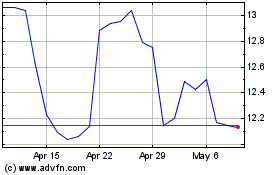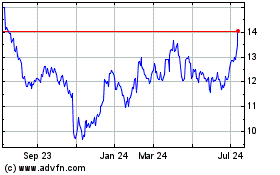Ford, Volkswagen Team Up on Pickups, Electric Vehicles -- Update
January 15 2019 - 1:22PM
Dow Jones News
By William Boston
Ford Motor Co. and Volkswagen AG have agreed to build a global
manufacturing alliance that the auto makers said could create
nearly $1 billion in annual savings after 2023.
Initial efficiencies would come through sharing production and
technology for medium-sized pickup trucks and VW's popular city
vans, followed by broader cooperation in developing electric and
self-driving vehicles, the companies said in an agreement presented
Tuesday on the sidelines of the Detroit Motor Show.
Ford CEO Jim Hackett and VW CEO Herbert Diess said the deal was
just the beginning of potential collaboration on a range of
projects, including bundling their development of self-driving
vehicles, which auto makers consider a key technology in the
future. Talks on these were under way and going well, the
executives said.
"Over the course of negotiations we constantly broadened the
scope of discussions," Mr. Diess told reporters. "We believe we can
explore further collaboration opportunities in exactly those fields
that will be pivotal for future success in the auto industry."
Ford shares were down 1% in midday trading. VW shares were
trading 1% higher.
The agreement comes as auto manufacturers increasingly cast
aside old rivalries to share the enormous costs of developing new
technology, aiming to lower the risks associated with developing
and launching electric and self-driving vehicles.
The success of the Ford-VW alliance isn't guaranteed. The global
automotive landscape is littered with failed partnerships,
highlighted most recently by the differences between the management
of French car maker Renault SA and its Japanese partner Nissan
Motor Co, which share a global alliance with Mitsubishi Corp.
But as the automobile morphs into a smartphone on wheels, auto
makers are forging more joint ventures and alliances to defray the
costs and risks of developing the requisite new technology.
General Motors Co. and Honda Motor Co. said last year that they
would jointly develop a self-driving car, a pact under which Honda
committed to investing $2.75 billion in GM's Cruise driverless car
program. The companies have also collaborated for years on
developing fuel-cell technology to power vehicles.
Under its agreement with VW, Ford will produce light commercial
vehicles and medium-sized pickup trucks for both companies,
expecting to launch the first vehicles by early 2022. VW will in
turn produce city vans for the venture.
Ford would initially save $500 million a year starting in 2023,
said Jim Farley, a senior executive in charge of global markets.
Volkswagen said it was targeting about $400 million in savings.
Investors had hoped Ford and VW would present much more detail
about their plans in Detroit.
Evercore ISI analyst Arndt Ellinghorst called the deal "a step
in the right direction" to address investor concerns about the
large capital outlays car companies must spend on low-margin parts
of their businesses, such as gas-powered commercial vans. Still,
the lengthy timeline for any lift from the alliance may not sway
investors currently worried about a slowdown in the Chinese market
and trade tensions, he said in a note.
--Mike Colias contributed to this article.
Write to William Boston at william.boston@wsj.com
(END) Dow Jones Newswires
January 15, 2019 13:07 ET (18:07 GMT)
Copyright (c) 2019 Dow Jones & Company, Inc.
Ford Motor (NYSE:F)
Historical Stock Chart
From Mar 2024 to Apr 2024

Ford Motor (NYSE:F)
Historical Stock Chart
From Apr 2023 to Apr 2024
